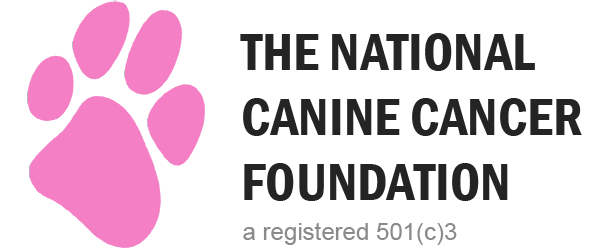
Frequently Asked Questions About Dogs with Cancer
What are the common side effects of chemotherapy in dogs?
Common side effects of chemotherapy in dogs include:
- Vomiting
- Diarrhea
- Dehydration
- Low energy
- Bladder irritation
- Decrease in white blood cell count (can lead to increased infection risk)
These side effects can vary greatly with the type of chemotherapy and the individual dog. It’s also important to know that there are ways to manage and minimize side effects to help maintain the dog’s quality of life during treatment. For more comprehensive information, read our blog Common Chemotherapy Side Effects.
What are the most common types of cancers in dogs?
- Lymphoma/Lymphosarcoma – Originates in the lymphatic system, affecting the body’s infection-fighting network.
- Mast Cell Tumor – Originates from mast cells, which are part of the immune system and can be found in various tissues throughout the body.
- Melanoma – A type of skin cancer that develops from melanocytes, the cells that produce pigment in the skin.
- Osteosarcoma – A type of bone cancer that originates in the cells that form new bone tissue, commonly affecting the long bones of the arms or legs.
- Hemangiosarcoma – A rapidly progressing and aggressive cancer that arises from the cells lining blood vessels, often found in the spleen, liver, or heart.
- Fibrosarcoma – A malignant tumor that develops from fibrous tissue, typically found in bones or soft tissues, and is characterized by the uncontrolled growth of fibroblast cells.
My dog has cancer, what do I do next?
Now you’ve received news no pet owner wants to hear. Your dog has cancer. Now what? Where do you go from here? Your dog’s veterinarian will usually talk to you about the options they may have for your dog if experienced. Many times, it’s a good idea to receive a referral to a specialist for further information and diagnostic testing.
It’s very important to research the type of cancer your dog is diagnosed with and see what possible treatments plans are out there for that type of cancer. This is where “Information Overload” can come into play. There’s so much available on the internet these days that it can become overwhelming. Here is a great article on our blog to help walk you through researching and finding help with the next steps. What To Do When Your Dog Is Facing A Cancer Diagnosis – Information Overload – The National Canine Cancer Foundation (wearethecure.org)
When to euthanize a dog with cancer?
The decision of when to say goodbye to a beloved dog is undoubtedly one of the most challenging aspects of pet ownership. If you are navigating the difficult decision of when to euthanize a dog with cancer, it is important to consider:
- Your dog’s type of cancer and its prognosis.
- Treatment options available.
- The dog’s overall health.
- Their well-being and level of comfort during and after treatment.
- Subtle signs, like persistent limping, heavy panting, or loss of appetite, give insight into your dog’s experience.
- Having an open discussion with your veterinarian, weighing factors such as pain levels and the potential difficulty of treatment.
While contemplating euthanasia is never easy, it’s a compassionate choice if your dog’s quality of life is compromised. Trusting your veterinarian’s guidance ensures a peaceful passing for your pet, reflecting the love and care they’ve received throughout their life. For more information, read the blog When To Say Goodbye To Your Dog With Cancer. If you are coping with the loss of a beloved dog, download a free copy of NCCF’s Grief Journal, where you can write down memories, add photos, and process your thoughts and emotions.
How much does it cost to treat canine cancer?
Cancer treatment for dogs can range greatly from a $500 surgery to a $10,000 in chemo therapy. The range is so vast because your dog’s medical condition and how cancer is manifesting are always unique. There are a variety of treatment options and palliative care that may be appropriate for your dog, so speaking to vet and understanding the range of options and their effectiveness is critical.
Can you help with cancer treatment funding?
Unfortunately, our mission statement does not allow us to fund individual cancer treatments, but we do have access to options that may work for you. We have put together two blog listings on our website to assist those in need of funding. Please visit 7 Fundraisers to Help Pay for Dog Cancer Treatment Cost – #helpdogs (wearethecure.org) for tips on fundraising ideas. Additionally, Financial Support for Your Dog’s Fight to Beat Cancer – The National Canine Cancer Foundation (wearethecure.org) has possible financial support options. We hope this information helps.
What are cancer treatment options for my dog?
There are several types of treatment for canine cancer available. Your veterinarian will review the best options of these, the survival rates and costs.
- Chemotherapy
- Radiation therapy
- Immunotherapy
- Cryotherapy
- Bone marrow transplants
- Palliative therapy
- Nutritional therapy
- Alternative therapies
What are the early warning signs of canine cancer?
As responsible dog owners, it’s vital to recognize the early signs and symptoms of canine cancer. The following are the top 10 indicators that your dog might have cancer:
- Lumps and Lesions
- Lymph Node Swelling
- Lameness
- Loss of Appetite
- Lethargy
- Loss of Weight
- Excessive Odor
- Loss of Normal Functions
- Bleeding or Discharge
- Labored Breathing
These symptoms should prompt a visit to the veterinarian for a thorough evaluation. Early detection increases the chances of successful treatment and potentially even a cure. Pet owners play a crucial role in spotting these signs and ensuring their furry companions receive timely medical attention. See our blog for a more detailed explanation of these cancer signs.
What causes cancer in dogs?
- Breed & Genetics: Certain dog breeds have a higher genetic predisposition to specific types of cancer.
- Age: As dogs age, their risk of cancer increases.
- Environmental Factors: Exposure to environmental toxins such as pesticides, herbicides, pollution, and secondhand smoke can contribute to cancer development.
- Diet: Poor nutrition, high carbohydrate diet, and the consumption of certain preservatives or additives may increase cancer risk.
- Obesity: Overweight or obese dogs are more susceptible to various health issues, including cancer.
- Hormones: Hormonal imbalances, like those seen in un-spayed female dogs and some endocrine disorders, can raise cancer risk.
- Sun Exposure: Dogs with thin or light-colored coats are more vulnerable to skin cancer due to excessive sun exposure.
- Viral Infections: Certain viral infections, like the papillomavirus and retroviruses, have been linked to cancer in dogs.
- Lack of Exercise: Sedentary lifestyles and lack of physical activity may increase the risk of health problems, including cancer.
- Chronic Inflammation: Ongoing inflammation, often caused by infections or chronic diseases, can lead to cellular damage that increases the risk of cancer.
Donating to the National Canine Cancer Foundation
Is the National Canine Cancer Foundation legit?
Yes, the National Canine Cancer Foundation (NCCF) is a legitimate organization. It is registered as a 501(c)(3) public charity, ensuring compliance with federal regulations for non-profit entities. Additionally, the NCCF has been recognized with the GuideStar Silver Seal of Transparency.
The foundation’s Scientific Advisory Board is made of esteemed professionals holding D.V.M, M.D., or Ph.D. degrees, and includes highly regarded researchers in various fields such as veterinary research, genetics, molecular biology, and other biological sciences.
What percentage of donations received is put towards research?
Approximately 85% of all money that comes into the foundation goes towards education, outreach and research.
How do I add a picture to my memorial donation?
If you’d like a photo added to your memorial donation on our donation wall of the website, please email the photo to stories.wearethecure@gmail.com. Please make sure to include the dogs name in the email and the name the donation was made under, so we make sure the photo goes with the correct donation listing.
Did You Know that life insurance or annuities can be part of your philanthropy?
You can designate the National Canine Cancer Foundation as a beneficiary of a life insurance policy or investment account. Most of the time all you need is the NCCF EIN number (03-0581083) to provide to your life insurance agent or financial advisor for the beneficiary designation. If you find that you need more information, please contact our office and we are happy to provide the necessary information or fill out forms.
Can a donation be directed to a certain cancer fund?
Yes, you can ask that a donation you make is allocated towards a certain fund within the foundation. For example, if you are donating and would like the funds to go towards Hemangiosarcoma Research, make sure to note that in your donation order. You can also email ordersnccf@gmail.com.
How do you apply for research grants?
You can visit Research Grants – The National Canine Cancer Foundation (wearethecure.org) to find out about past and current grants that have been funded through the foundation. To apply for grants or to find more information please fill out a contact form at Contact Us – The National Canine Cancer Foundation (wearethecure.org)
Who do I contact to get a year-end donation letter for my records?
Please fill out our contact form at Contact Us – The National Canine Cancer Foundation (wearethecure.org) and we will be in touch to help you.
NCCF Resources, Events & Products
How can I help NCCF's mission of ending canine cancer?
With our focus on funding research and providing dog owners the resources they need to keep dogs healthy, there are a variety of ways to help support our mission.
- Tax-deductible donations
- Life insurance or annuity donations
- Purchasing NCCF apparel
- Tagging us on social media
How can I download a copy of your Wellness Planner & Journal?
To download a free copy of our Wellness Planner & Journal please visit FREE Dog Planner and Wellness Journal – National Canine Cancer Fdn (wearethecure.org)
How can I find out about upcoming events?
Is there a return policy on products purchased from your online store?
What canine cancer resources are available at NCCF?
NCCF offers a trove of helpful resources to empower both you and your furry friend with knowledge, comfort, and guidance through this challenging journey.
Do you allow sponsored posts?
We currently do not allow sponsored posts from outside sources. If you have any further questions about this topic please use our contact form at Contact Us – The National Canine Cancer Foundation (wearethecure.org)

